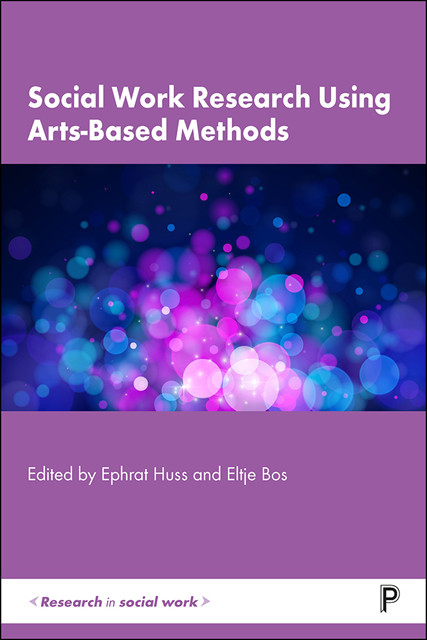Book contents
- Frontmatter
- Dedication
- Contents
- List of figures and tables
- Notes on contributors
- Introduction
- Section I Arts-based research as a method to understand and give voice to marginalised groups
- Section II Using arts-based research to listen to, and give voice to, children in social work
- Section III Arts-based research as a way for researchers and community members to understand communities
- Epilogue
- Index
10 - Using creative art research approaches to assess arts-based interventions with children in post-disaster contexts
Published online by Cambridge University Press: 13 October 2022
- Frontmatter
- Dedication
- Contents
- List of figures and tables
- Notes on contributors
- Introduction
- Section I Arts-based research as a method to understand and give voice to marginalised groups
- Section II Using arts-based research to listen to, and give voice to, children in social work
- Section III Arts-based research as a way for researchers and community members to understand communities
- Epilogue
- Index
Summary
Introduction
Creative art research approaches are gaining in popularity in recent years and are increasingly being used in social work, health, and other disciplines (Vanover et al., 2018). Arts-informed approaches can serve as expressive therapies, and have been successfully applied in psychotherapy, counselling, and rehabilitation for decades (Malchiodi, 2005). Creative art research approaches expand the domain of qualitative inquiry and enable social science researchers to incorporate and utilise arts-based methodologies to better understand human behaviour, perspectives, and experiences (Leavy, 2017). Arts-based scholarly research is located in the creation of art, based on extensive artistic training, while arts-informed research is used to express the experiences, perspectives, and emotions of research participants (Shannon-Baker, 2015). Arts-informed research mainly focuses on the advancement of knowledge rather than merely the production or creation of artwork or art craft for this purpose. It facilitates the possibility of establishing deeper and genuine human connections by capturing different perspectives and expressions due to its expressive qualities (Leavy, 2017).
Art and creative methods in social work research are consistent with the philosophy, mission, and values of the profession (Peek et al., 2016). Shannon (2013) discusses several key components of social work research that includes active community participation, understanding of the local contexts, mutual dialogue and understanding, and facilitating social change leading to empowerment, equality, and social justice. The profession of social work strongly values and respects the inherent worth and dignity of all people (IFSW & IASSW, 2004), and arts-informed creative research approaches provide an ethical platform to inquire about the lived experiences of individuals and communities (Jarldon, 2016). Arts-informed approaches allow social workers to learn how service users develop their inner strength by recognising ‘the inherent worth and dignity’ of an individual person (Foster, 2012). Arts-based and arts-informed research approaches assist research practitioners in engaging participants to create a narrative of their story or experience using art. By doing this, it invites participation and the expression of diverse perspectives, and provides an empowering experience for both participants and researchers (Jarldorn, 2016).
This chapter highlights the significance and application of creative art research approaches using a ‘Youth Paint Nite’ activity with children and youth in a post-disaster context in Alberta, Canada.
- Type
- Chapter
- Information
- Social Work Research Using Arts-Based Methods , pp. 117 - 126Publisher: Bristol University PressPrint publication year: 2022

